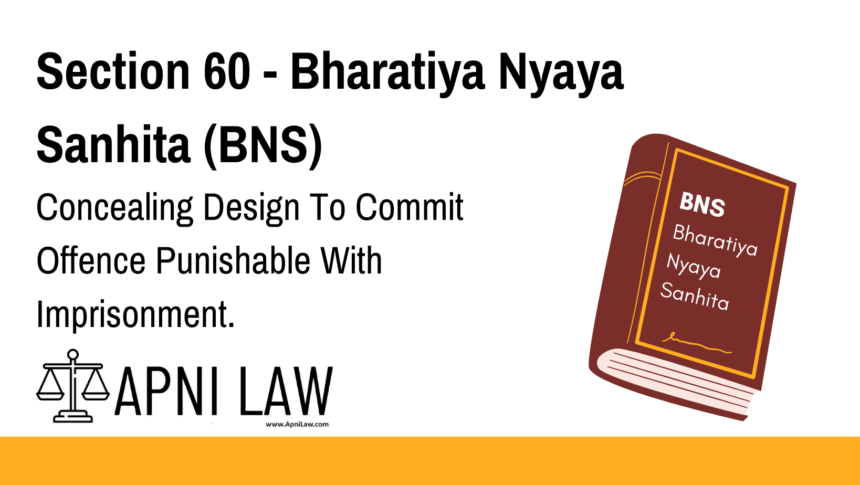Code: Section 60 BNS
Whoever, intending to facilitate or knowing it to be likely that he will thereby
facilitate the commission of an offence punishable with imprisonment, voluntarily conceals,
by any act or illegal omission, the existence of a design to commit such offence, or makes any
representation which he knows to be false respecting such design shall,––
(a) if the offence be committed, be punished with imprisonment of the description
provided for the offence, for a term which may extend to one-fourth; and
(b) if the offence be not committed, to one-eighth,
of the longest term of such imprisonment, or with such fine as is provided for the offence, or
with both.
Explanation of Section 60 BNS
Section 60 of the Bharatiya Nyaya Sanhita, 2023 (BNS) criminalizes the concealment of an intended crime that is punishable by imprisonment. Unlike Section 58 (which applies to offences punishable with death or life imprisonment) and Section 59 (which applies to public servants), this section covers all individuals who knowingly hide information about an impending offence.
Key Elements of Section 60 BNS
- Knowledge and Intent to Conceal
- The accused must have intended to facilitate or known that their actions would likely facilitate a crime.
- Voluntary Concealment or False Representation
- The concealment can be through an act or illegal omission.
- If a person knowingly gives false information to mislead authorities, they are liable.
- Punishment Varies Depending on Whether the Crime Occurred
- If the crime is committed → Imprisonment up to one-fourth of the maximum punishment for the offence.
- If the crime is not committed → Imprisonment up to one-eighth of the maximum punishment or fine.
Illustrations
Example 1: Concealing a Planned Burglary
A learns that B and C are planning a burglary. Instead of informing the authorities, A remains silent. The burglary is committed. Under Section 60(a), A can be sentenced to one-fourth of the maximum imprisonment for burglary.
Example 2: Spreading False Information to Mislead Authorities
X knows that a group is planning an illegal arms trade, but instead of reporting it, he falsely informs the police that no such activity is happening. If the crime is committed, X is punishable under this section.
Example 3: Concealing a Crime That Was Never Committed
Z knows that his friend is planning an unauthorized financial fraud but does not report it. However, the fraud does not occur. Z is still punishable under Section 60(b) with one-eighth of the maximum imprisonment for financial fraud or a fine.
Common Questions and Answers on Section 60 BNS
1. How is Section 60 different from Sections 58 and 59 BNS?
- Section 58 BNS applies to concealment of crimes punishable with death or life imprisonment.
- Section 59 BNS applies to public servants failing to report crimes.
- Section 60 BNS applies generally to all offences punishable with imprisonment, regardless of the offender’s status.
2. What happens if a person unknowingly conceals a crime?
Section 60 applies only when the person knowingly conceals the crime. If there was no intent or knowledge, they are not liable.
3. Is concealing a minor offence punishable under Section 60?
Yes, even if the offence carries a lesser punishment, knowingly concealing it can result in imprisonment or a fine under Section 60 BNS.
4. Does digital concealment of information count under this section?
Yes, using encryption, deleting evidence, or hiding digital records related to a crime can still lead to punishment under Section 60 BNS.
5. Can a person be fined instead of imprisonment under Section 60 BNS?
Yes, in cases where the offence is not committed, the law provides for either imprisonment or a fine, or both.
Conclusion
Section 60 BNS ensures that individuals who knowingly conceal information about a planned crime are held accountable. Whether or not the crime is committed, the law imposes proportionate punishment to prevent intentional suppression of criminal activities.
For more legal insights, visit ApniLaw! 🚀











